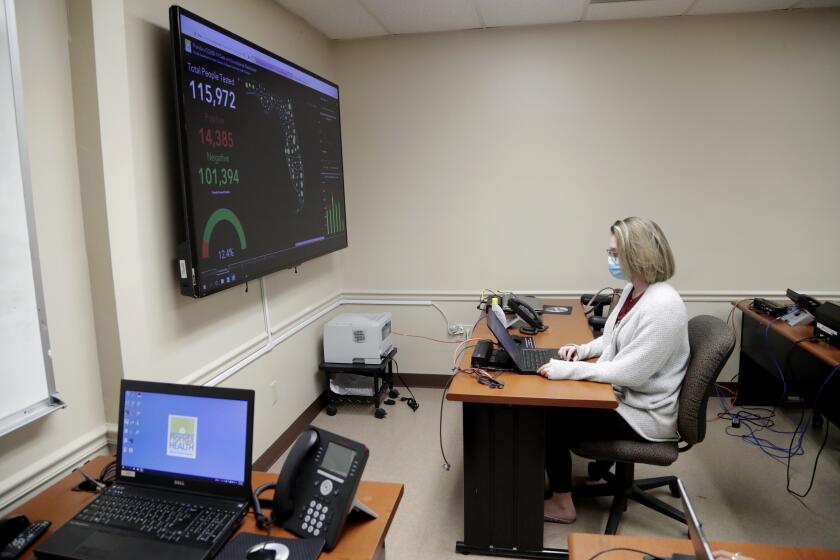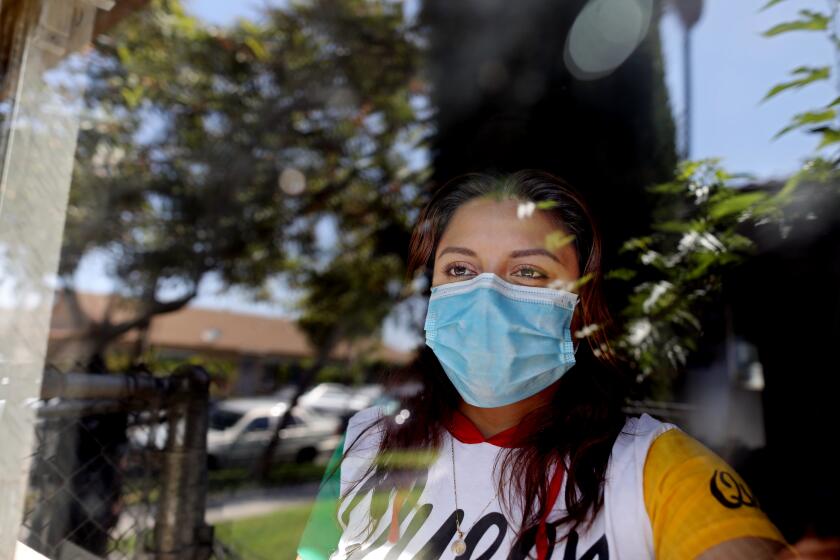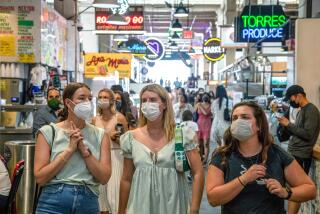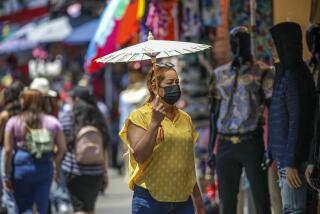Do L.A. politicians who pushed for reopening now have regrets as coronavirus cases climb?
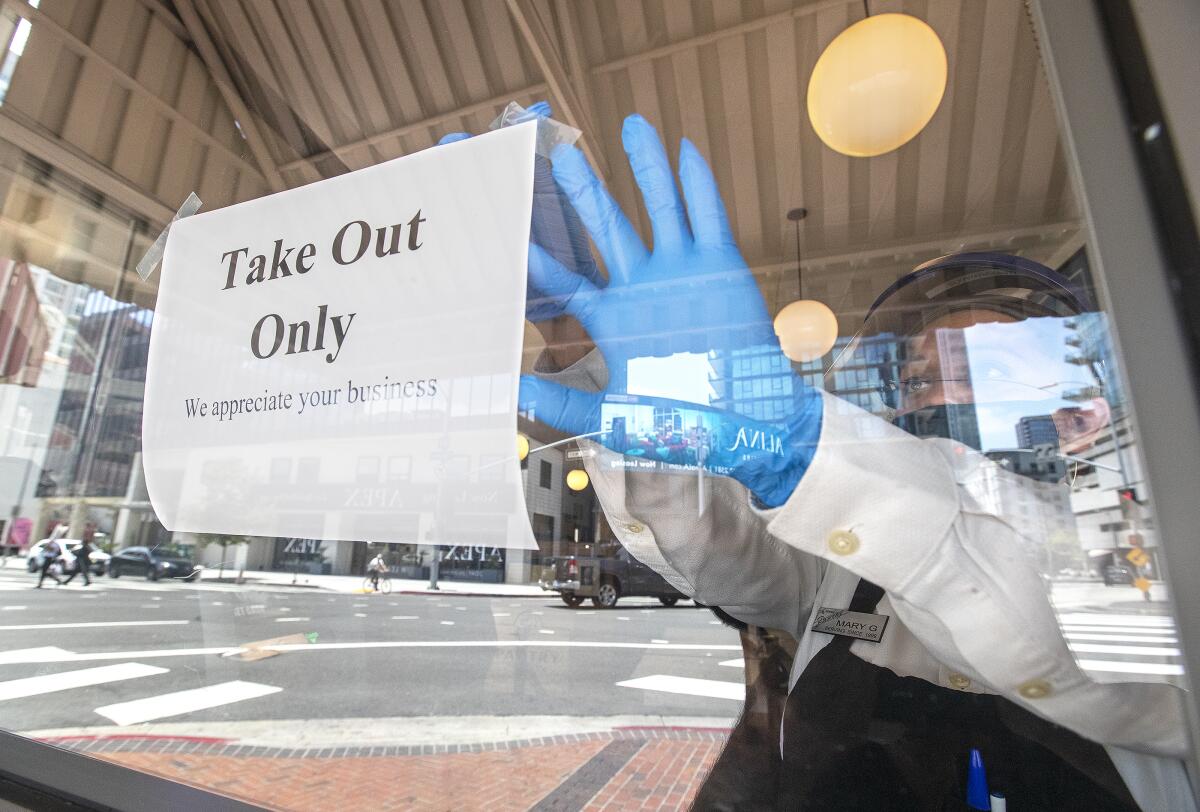
- Share via
The death toll in Los Angeles County had just topped 2,000 and public health officials were painting a grim scenario. “This is a very sad milestone for us,” county Public Health Director Barbara Ferrer said during a news conference on May 21.
But around the same time, some county supervisors were pushing to reopen the economy. Supervisor Janice Hahn asked Gov. Gavin Newsom that same week to allow retailers to reopen at limited capacity.
And Supervisor Kathryn Barger, the following week, co-authored a motion with Hahn at the Board of Supervisors meeting that led to the county’s reopening. L.A. County, she said, based off the data, had flattened the curve, and it was time to move forward. Soon, not only were barbershops and salons reopening but also all retailers at 50% capacity.
One month later, the pandemic has roared back, forcing public health officials to reverse some reopening efforts. Newsom on Wednesday ordered 19 counties, including L.A., to halt visits to indoor restaurants, bars, wineries and tasting rooms, entertainment centers, movie theaters, zoos, museums and card rooms for the next three weeks.
Any regrets from the supervisors?
Not Barger. She stands firm in her view that businesses must be allowed to remain open at least in some capacity. Hahn and other supervisors, however, are more cautious.
“I do not have any regrets about the speed at which we reopened because I felt we were very deliberate in how we as a county moved that forward,” Barger said. “The lessons learned, in hindsight, were we didn’t stress enough that just because we’re reopening doesn’t mean the virus isn’t very much still in the community.”
But would she support another shutdown?
“I’d be hard-pressed to support rolling back and having a complete shutdown again,” Barger said in an interview Wednesday. “There are people out there that are truly wondering if they’re going to have a business to come back to, or whether people are going to have jobs to come back to.”
While Barger, the only Republican on what’s arguably the most progressive Board of Supervisors in its history, remains cautious of further shutdowns, Hahn said more businesses might need to close to protect the public.
“To be honest with you, we knew how difficult it would be to reclose, and to walk it back,” Hahn said. “We knew that would not go over well, but we have to right now.
“We might have tried to get back to normalcy too soon,” Hahn later added.
Barger and Hahn both say they’re frustrated that the county’s contact tracing teams haven’t been able to provide more precise data on how and where outbreaks are occurring.
“I want to know where this is happening,” Hahn said. “Where are people getting this? Is it the grocery store? Is it in the churches? Is it the restaurants? Is it at the beaches? Is it riding Metro? Is it at the bars? And that’s more difficult to ascertain. Apparently contact tracing is a difficult procedure to gather all the information you’d liked to have.”
As states reopen, local health departments scramble to hire enough people to trace the contacts of everyone who tests positive for the coronavirus.
In her public statements, Hilda Solis — whose 1st District includes communities such as East L.A. with more than 2,600 cases, the most confirmed cases of the coronavirus in the county — has been cautious in her support for reopening.
“In hindsight, I think we probably could have gone slower,” Solis said in an interview Wednesday, “and I think we’re still learning much about this pandemic because obviously, it’s relentless.”
In the first two months, residents were “very much aware” about adhering to the public health order, Solis said.
People stayed at home, but as a result, the county’s economy suffered greatly, especially in retail and tourism jobs, where a high percentage of workers are people of color and women, particular Latinos, she said.
People who work as janitors, factory workers and grocery store clerks do not have the luxury of telecommuting, and thousands of people work multiple jobs, such as home healthcare nurses who moonlight in other healthcare settings, or retail workers who work at multiple stores, she said. They are unlikely to have the savings to get them through the pandemic but also are at an incredibly heightened risk of getting sick, she said.
Many essential workers — cashiers, truck drivers, meat packers — are Latino. They can’t stay home. And they’re being hit hard by the novel coronavirus.
These are the workers whom Solis said she worries most about if the county shuts down businesses again.
“It’s going to again be saddled on the backs of the people who need these jobs. Here we go again with another redoubling down. How much can they sustain? That’s my question, and why can’t we do more?” Solis said, adding that the county must allocate much of the $1 billion it received from the federal CARES Act for underresourced communities and families of color to ensure they have ample access to healthcare, testing and protective equipment.
Solis said as the county moves forward, businesses that do not comply with safety regulations must face consequences.
Supervisor Sheila Kuehl agreed, saying she was frustrated at how many restaurant and bars failed to enforce masks and social distancing after the county moved to reopen.
“We thought there would be a high level of compliance, and frankly, we wanted to have a trusting relationship with the business community because we didn’t want people to be out of work, and we thought, if they followed the rules, we would continue to be safe,” Kuehl, whose 3rd District stretches from the ocean to Los Feliz, said. “Well, they didn’t.”
At Tuesday’s Board of Supervisors meeting, Kuehl will introduce a motion, co-authored by Hahn, that asks the county’s Department of Public Health to develop a plan on how to fine businesses that ignore the county’s coronavirus protocols and, if they continue to forgo public safety, to pull their licenses.
Kuehl said she wishes more residents would call out businesses that ignore the county’s health order.
While at her favorite restaurant, Kuehl noticed three tables were set up outside, separated by hedges and only two feet apart. She told the restaurant that it needed to remove the middle table to ensure patrons were six feet apart.
“This is serious,” she said. “If you want to stay open, you’re going to have to comply because we’re going to have to get serious again if people don’t obey.”
Times staff writers Colleen Shalby and Ron Lin contributed to this report.
More to Read
Sign up for Essential California
The most important California stories and recommendations in your inbox every morning.
You may occasionally receive promotional content from the Los Angeles Times.
